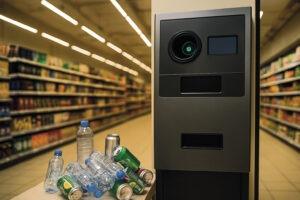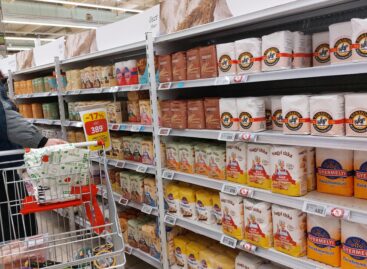“The reverse vending machine system is 20th century technology in the 21st century”
An interview with Miklós Nagy, technical secretary of the Hungarian Association of Packaging and Material Handling (CSAOSZ).

This article is available for reading in Trade magazin 2025/11.
![]() What do you think about the operation of the deposit refund system (DRS) so far?
What do you think about the operation of the deposit refund system (DRS) so far?

Miklós Nagy
technical secretary
CSAOSZ
– On the one hand, it is good to hear that consumers have accepted this new system and are taking advantage of the return option. On the other hand, we don’t know how the volume of returns compares to emissions, i.e. whether the 77% collection rate required by the SUP Directive for 2025 can be achieved or whether the results have already exceeded it.
![]() How does the DRS system affect domestic manufacturers and distributors?
How does the DRS system affect domestic manufacturers and distributors?
– CSAOSZ has serious reservations about the DRS system. The reverse vending machine system is 20th century technology in the 21st century. Legal requirements would have allowed for the later introduction of a system based on digital technology.
![]() What are the main trends and challenges currently experienced in the field of sustainable packaging in Hungary?
What are the main trends and challenges currently experienced in the field of sustainable packaging in Hungary?
– There is great pressure from the market for sustainable solutions, but we still see version 1.0, where users are focused on the “just don’t contain plastic” approach.
![]() What changes will the Packaging and Packaging Waste Regulation (PPWR, 2025/40/EU), which entered into force on 11 February 2025 and will be applied from 12 August 2026, require at the domestic level?
What changes will the Packaging and Packaging Waste Regulation (PPWR, 2025/40/EU), which entered into force on 11 February 2025 and will be applied from 12 August 2026, require at the domestic level?
– As the PPWR is a regulation, it is uniformly applicable in all EU member states and doesn’t need to be transposed at national level. The regulation requires a comprehensive review by companies manufacturing packaging.
![]() What is your vision for the future of the packaging sector in light of the new domestic systems (EPR, DRS) and EU regulations (e.g. PPWR)?
What is your vision for the future of the packaging sector in light of the new domestic systems (EPR, DRS) and EU regulations (e.g. PPWR)?
– In my opinion it isn’t the packaging industry that needs to rethink its approach, but packaging material users. The packaging industry manufactures what it is ordered to manufacture.

„The packaging industry manufactures what it is ordered to manufacture”
![]() How are sustainability expectations for packaging changing as consumer awareness increases?
How are sustainability expectations for packaging changing as consumer awareness increases?
– I believe the return system is a simple, personal financial issue: the consumer wants to get back the 50 forints they lent. Those who return bottles and cans haven’t left them on the side of the road until now and the opposite of this is also true.
![]() What key changes still need to be made to domestic regulations to ensure sustainable packaging?
What key changes still need to be made to domestic regulations to ensure sustainable packaging?
– Shaping the legal environment is essential. One example is the enforcement of the so-called eco-modulation principle in EPR regulations: lower EPR fees should be paid for packaging that is more environmentally friendly.
![]() What do you think about this year’s HUNGAROPACK Hungarian Packaging Competition 2025?
What do you think about this year’s HUNGAROPACK Hungarian Packaging Competition 2025?
– We received lots of forward-looking entries in terms of sustainability, most of which are focusing on less spectacular but more cost-effective collection and transport packaging solutions.

“Success propaganda is not mindset-shaping”
Possibility of mid-year fee adjustments
Published on 18 September, Government Decree 292/2025 (IX. 18.) fundamentally changed the operating framework of the packaging sector. Citing the emergency situation, the legislation paved the way for mid-year EPR fee adjustments, which had previously been impossible. Industry organisations warn that due to the unpredictability of the regulations, companies will need to build greater flexibility into their operations.
Fee increases from October
Published on 22 September, Decree 28/2025. (IX. 22.) by the Ministry of Energy brought about significant changes in EPR fees from 1 October. The fees for glass, wood, textiles and associated material flows have increased, while there have been no changes for plastics, paper and metals. Companies can only manage the immediate cost growth if flexible clauses in their supplier and trade contracts allow for a rapid price compensation for the fee increases.
New fee corrections in the return system
Not only have EPR fees changed, but there were also important changes in the operation of the DRS system. From September MOHU introduced new handling fees for the REpont return points of retailers, which affect both automatic and manual collection solutions. These changes have a direct economic impact on retail chains and independent retailers, as they affect the costs of maintaining the return infrastructure
Related news
2026: stricter EU rules and digital waste tracking
🎧 Hallgasd a cikket: Lejátszás Szünet Folytatás Leállítás Nyelv: Auto…
Read more >Related news
(HU) Hétéves növekedési stratégiát jelentett be az Auchan
🎧 Hallgasd a cikket: Lejátszás Szünet Folytatás Leállítás Nyelv: Auto…
Read more >







